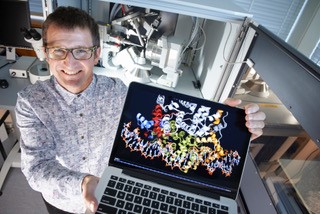Exploring the temperature-dependence of Earth’s biosphere over time and space

Professor Vic Arcus and Professor Louis Schipper from the University of Waikato with Dr Liyin Liang of Manaaki Whenua - Landcare Research, and Dr Bella Duncan from Victoria University of Wellington have been awarded an inaugural Marsden Fund Council Award to determine whether there is a single theory of temperature dependence that applies to life in a range of scales in time and space
Published on 5 November 2019
A defining feature of all biological systems, including microbes, plants and animals, is their ability to catalyse a wide range of chemical reactions at ambient temperatures. Enzymes are extraordinary catalysts that enable life forms to flourish in nearly every available part of our planet. These large, yet delicate, molecules show unusual responses to changes in temperature and, in turn, this has a significant impact on how biological systems respond. Professor Vic Arcus and Professor Louis Schipper (University of Waikato) have already developed a theoretical framework called Macromolecular Rate Theory (MMRT), which explains the behaviour of enzymes at different temperatures. Along with Dr Liyin Liang (Manaaki Whenua - Landcare Research), and Dr Bella Duncan (Victoria University of Wellington), Professor Arcus and Professor Schipper will use their Marsden Fund Council Award to discover a new model of the biosphere based on MMRT that will allow people to accurately predict the temperature dependence of biological rates across scales.
The researchers predict that the signature of enzyme MMRT is found in complex processes such as microbial growth rates, plant and soil respiration, photosynthesis and, ultimately, the removal and storage of atmospheric carbon dioxide into the landscape. To test this unifying hypothesis, they have assembled a team of research scientists working across disciplines including chemical physicists, molecular biologists, plant physiologists, soil scientists, climate modellers and palaeoclimate experts.
Predicting the behaviour of biological systems and their response (and feedback) to increasing atmospheric greenhouse gases and climate warming is one of the grand challenges in interdisciplinary science.
